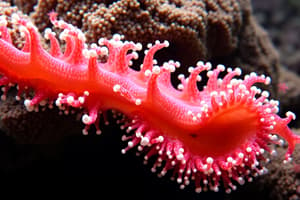Podcast
Questions and Answers
What triggers the release or firing of nematocysts?
What triggers the release or firing of nematocysts?
- Thermal stimulation of the hydrocaulus
- Chemical stimulation of the cnidocyte
- Tactile stimulation of the cnidocil (correct)
- Electrical stimulation of the nerve net
What is the function of the annulus in Hydra?
What is the function of the annulus in Hydra?
- Produces nematocysts for capturing prey
- Provides structural support to the body
- Regulates water flow through the hydrocaulus
- Gives flexibility and support to the hydrocaulus (correct)
What is the primary function of nematocysts in Cnidarians?
What is the primary function of nematocysts in Cnidarians?
- Providing structural support to the body
- Regulating water flow through the hydrocaulus
- Capturing and digesting prey (correct)
- Paralyzing predators
How many monophyletic clades are Cnidarians classified into?
How many monophyletic clades are Cnidarians classified into?
What is the shape of the body of Aurelia aurita?
What is the shape of the body of Aurelia aurita?
What is the function of the cnidocyte?
What is the function of the cnidocyte?
What is the symmetry type exhibited by Cnidarians?
What is the symmetry type exhibited by Cnidarians?
How many species of Cnidarians are estimated to exist?
How many species of Cnidarians are estimated to exist?
What is the characteristic of the body wall of Cnidaria?
What is the characteristic of the body wall of Cnidaria?
What is the function of the gastrovascular cavity in Cnidaria?
What is the function of the gastrovascular cavity in Cnidaria?
What is the characteristic of cnidocytes in Cnidaria?
What is the characteristic of cnidocytes in Cnidaria?
What is the characteristic of the nematocysts in Cnidaria?
What is the characteristic of the nematocysts in Cnidaria?
What is the characteristic of the body plans of Cnidaria?
What is the characteristic of the body plans of Cnidaria?
What is the characteristic of the life cycle of many Cnidaria?
What is the characteristic of the life cycle of many Cnidaria?
What is the habitat of most Cnidaria?
What is the habitat of most Cnidaria?
What is the example of a polymorphic Cnidaria?
What is the example of a polymorphic Cnidaria?
What is the function of cnidocil?
What is the function of cnidocil?
What is the term for the 'stinging cells' that contain a nematocyst?
What is the term for the 'stinging cells' that contain a nematocyst?
What is the function of zooxanthellae in scleractinian corals?
What is the function of zooxanthellae in scleractinian corals?
What is the term for the stalk-like structure that contains the mouth and connects to the coelenteron?
What is the term for the stalk-like structure that contains the mouth and connects to the coelenteron?
What is the term for the free-swimming, flattened, ciliated, and bilaterally symmetrical larval form of cnidarians?
What is the term for the free-swimming, flattened, ciliated, and bilaterally symmetrical larval form of cnidarians?
What is the term for the organelle within a cnidocyte that is used for prey capturing and defense?
What is the term for the organelle within a cnidocyte that is used for prey capturing and defense?
What is the term for a strobilating polyp that produces young adult medusae called ephyra?
What is the term for a strobilating polyp that produces young adult medusae called ephyra?
What is the term for a type of medusa that has a velum?
What is the term for a type of medusa that has a velum?
Flashcards are hidden until you start studying
Study Notes
Phylum Cnidaria
- Radial symmetry and diploblastic (develop from two embryonic layers: ectoderm and endoderm)
- Two distinct body plans: polyp (sessile) and medusa (motile)
- Body wall consists of: epidermis, gastrodermis, and non-living, jelly-like mesoglea
- Gastrovascular cavity: open only on one end (mouth), serves as digestive tract for extracellular digestion
Characteristics of Cnidarians
- Presence of stinging cells called cnidocytes, often located on tentacles, around mouth, and in gastrodermis
- Cnidocytes contain stinging organelles called nematocysts, which may contain barbs or spines
- Nematocysts are triggered by tactile stimulation of cnidocil (hair-like projection)
- Release of nematocysts can entangle or pierce prey, injecting toxic substances to paralyze
Nerve System and Symmetry
- Nerve net system complements radial symmetry
- Two monophyletic clades: Medusozoa and Anthozoa
Hydra and Other Cnidarians
- Hydra: exhibits dimorphism, has spermaries and ovary, and annulus provides flexibility and support to hydrocaulus
- Obelia: colonial hydroid, exhibits dimorphism
- Aurelia aurita: bell-shaped, saucer-shaped medusa with eight marginal lobes and stinging tentacles
- Hydra budding: a method of reproduction
Corals and Zooxanthellae
- Mutualistic relationship: coral provides CO2 and water for photosynthesis, and zooxanthellae produce oxygen and help remove waste
- Ecological values of coral reefs:
- Protect coastlines from storms and erosion
- Provide ecosystem for underwater life
- Provide source of livelihood for local communities (fishing, tourism)
Cnidarian Terminology
- Nematocyst: organelles within a cnidocyte used for prey capturing and defense
- Cnidocil: mechanosensory receptor that elicits nematocyst discharge
- Cnidocyte: "stinging cells", an explosive cell containing a nematocyst that delivers a sting
- Planula: free-swimming, flattened, ciliated, and bilaterally symmetrical larval form of cnidarians
- Strobili: a strobilating polyp that produces young adult medusae called ephyra
- Manubrium: a stalk-like structure that contains the mouth and connects to the coelenteron
- Hydrotheca: a structure that provides protection to the medusae
Studying That Suits You
Use AI to generate personalized quizzes and flashcards to suit your learning preferences.




